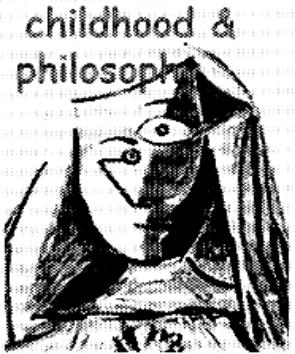shaping inclusion: possibility of “community of inquiry” in people with intellectual disabilities
DOI:
https://doi.org/10.12957/childphilo.2025.89466Keywords:
inclusion, intellectual disability, ethnomethodology and conversation analysis, careAbstract
This study aimed to provide insight into Philosophy for/with Children (P4wC) in young people with intellectual disabilities (IDs). Awareness of the social constructive side of disability is necessary for any consideration regarding the possibility of philosophical dialogue with people with IDs. Using a case study and adopting ethnomethodology and conversation analysis (EMCA), this research focused on interactions between people with IDs to clarify what the non-disabled researcher was not aware of in their dialogue. The research was conducted in the Kobe University Program for Inclusion (KUPI), where young adults with IDs are inclusively learning at university. p4c Hawaii’i (p4cHI) is used as a part of the program. The case was a dialogue about a student who cannot talk because of severe disability. KUPI students cooperated to expand on the goal of the dialogue, from just talking about their schoolmate to jointly generating inclusive settings of dialogue. The purpose of the dialogue was achieved in a manner that demonstrated the potential for inclusive inquiry. They presented diverse and unique approaches to care. This embodies the “community of inquiry” that involves people with IDs.
Downloads
References
Akagi, K., Kawaji, A., Tsuda, E., Kannan, M., Sato, T., Tonogaki, R., Shibata, M., & Kurokawa, Y. (2023). What did the 3-year-college-education program in the University to train educational professionals bring about to the youth with intellectual disabilities? Bulletin of Graduate School of Human Development and Environment, Kobe University [Kobe daigaku daigakuin ningen hattatu kankyougaku kenkyuuka kenkyuu kiyou], 16(2), 87–95.
Antaki, C., & Wilkinson R. (2012). Chapter 26: Conversation Analysis and the Study of Atypical Populations. In J. Sidnell & T. Stivers (Eds.), The Handbook of Conversation Analysis (pp. 533–550). Blackwell Publishing.
Backman, Y., Gardelli, T., Gardelli, V., & Strömberg, C. (2019). Group argumentation development through philosophical dialogues for persons with acquired brain injuries. International Journal of Disability, Development and Education, 67(1), 107–123.
Cassidy, C., Marwick, H., Deeney, L., & McLean, G. (2018). Philosophy with children, self-regulation and engaged participation for children with emotional-behavioural and social communication needs. Emotional and Behavioural Difficulties, 23(1), 81–96.
Clark, H. H., & Carlson, T. B. (1982). Hearers and speech acts. Language, 58(2), 332–373.
Dickerson, P., Rae, J., Stribling, P., Dautenhahn, K., & Werry, I. (2005). Autistic children’s co-ordination of gaze and talk: Re-examining the ‘asocial’ autist. In K. Richards & P. Seedhouse (Eds.), Applying Conversation Analysis (pp. 19–37). Palgrave Macmillan UK.
Ferreira, J. M., & Bottema-Beutel, K. (2024). The interactional structure of accounts during small group discussions among autistic children receiving special education support in Finland. Journal of Autism and Developmental Disorders, 54(5), 1928–1946.
Gardelli, V., Backman, Y., Gardelli, Å., & Franklin, A. (2023). “You talk and try to think, together” – A case study of a student diagnosed with autism spectrum disorder participating in philosophical dialogues. Childhood & Philosophy, 19, 1–28.
Garfinkel, H. (1967). Studies in Ethnomethodology. Prentice-Hall.
Inoue, T., & Kado, Y. (2022, August 8-10). How Can We Have Communication with People with Intellectual Disabilities: A Case Study in p4c with Young People [Tetsugaku taiwa ni okeru fuwa to seijisei: chiteki shogai no aru seinenra to no taiwa jissen kara][Conference presentation]. ICPIC 2022, Tokyo, Japan.
Jackson, T. E. (2012). Home Grown. Educational Perspectives, 44(1/2), 3–7.
Jackson, T. E. (2019). Gently Socratic Inquiry. https://p4chawaii.org/wp-content/uploads/Gently-Socratic-Inquiry-2019.pdf
Kizel, A. (2024). Enabling Students’ Voices and Identities: Philosophical Inquiry in a Time of Discord. Lexington Books.
Lukey, B. (2004). Rethinking dialogue: Reflections on P4C with autistic children. Thinking: The Journal of Philosophy for Children, 17(1), 24–29.
Maynard, D. W. (2005). Social Actions, Gestalt Coherence, and Designations of Disability: Lessons from and about Autism. Social Problems, 52(4), 499-524.
Okamoto, M. (2018). kikite koudou ga haramu nijuu no tasha shikousei: manzai no tsukkomi kara miru kikite koudou kenkyuu no shatei [The Double Directivity for Others that Listenership Involves: the Perspective of Listenership Studies from Tsukkomi of Manzai]. In K. Murata (Eds), Research on Listenership in Communication Studies [kikite koudou no communication gaku]. Hitsuji-shobou.
Rapley, M. (2004). The Social Construction of Intellectual Disability. Cambridge University Press.
Sacks, H., Schegloff, E. A., & Jefferson, G. (1974). A simplest systematics for the organization of turn-taking for conversation. Language, 50(4), 696–735.
Sacks, H. (1985). Notes on methodology. In J. M. Atkinson (Ed.), Structures of Social Action (pp. 21–27). Cambridge University Press.
Walton, C., Antaki, C., & Finlay, W. M. L. (2020). Difficulties Facing People with Intellectual Disability in Conversation: Initiation, Co-ordination, and the Problem of Asymmetric Competence. In R. Wilkinson, J. P. Rae, & G. Rasmussen (Eds.), Atypical Interaction: The Impact of Communicative Impairments within Everyday Talk (pp. 93–127). Cham, Springer International Publishing.
Wilkinson, R. (2019). Atypical interaction: Conversation analysis and communicative impairments. Research on Language and Social Interaction, 52(3), 281-299.



